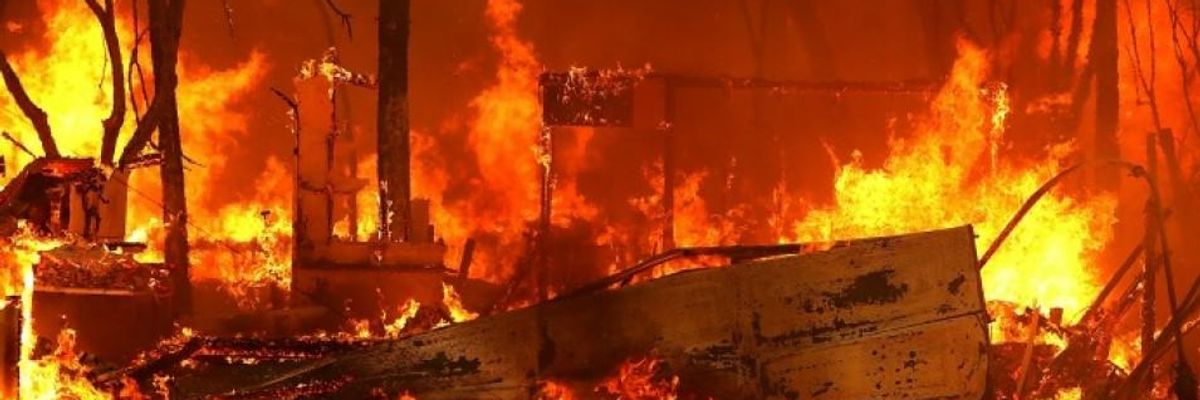Environmental advocacy groups issued mixed responses Tuesday after Democrats on the House Energy and Commerce Committee released the legislative text of a draft bill for a national climate plan, with critics charging that the proposal isn't ambitious enough to address the planetary crisis.
"At a moment when we need bold, decisive action from Democrats in Congress in order to stand a chance of averting climate catastrophe, Rep. Pallone and the House Energy and Commerce Committee have come up far short. Simply put, this legislation is a 'green new dud,' not a Green New Deal."
--Mitch Jones, Food & Water Action
The draft Climate Leadership and Environmental Action for our Nation (CLEAN) Future Act--largely seen as a "competing plan" to the Green New Deal--was announced earlier this month by the committee's chair, Rep. Frank Pallone (D-N.J.). Crafted after 15 committee hearings, the bill (pdf) aims to ensure that the United States achieves net-zero greenhouse gas pollution by 2050.
In a joint statement with Reps. Paul Tonko (D-N.Y.) and Bobby Rush (D-Ill.), Pallone said Tuesday that "every day, communities across the country are paying the price for inaction through record wildfires, flooding, and drought, and Congress cannot afford to simply watch from the sidelines."
"The CLEAN Future Act treats this climate crisis like the emergency that it is, while also setting the foundation for strengthening our economy and creating good paying jobs for a clean and climate-resilient future," they added. "We look forward to continuing to work with all impacted stakeholders on this proposal in the coming months."
Food & Water Action policy director Mitch Jones was quick to provide critical feedback with a statement of his own Tuesday.
"At a moment when we need bold, decisive action from Democrats in Congress in order to stand a chance of averting climate catastrophe, Rep. Pallone and the House Energy and Commerce Committee have come up far short," he said. "Simply put, this legislation is a 'green new dud,' not a Green New Deal."
Detailing some of the ways in which the CLEAN Future Act falls short of adequately addressing the crisis, Jones added:
This proposed clean electricity goal represents a wholly inadequate approach that would allow for the continued long-term use of an array of dirty energy sources--including fracked gas with unproven, undeveloped 'carbon capture' methods. A 'technology-neutral' approach leaves us primed for decades more greenhouse gas emissions.
A bold climate plan must call for a ban on fracking and all new fossil fuel infrastructure, and a swift and just transition to 100 percent clean, renewable energy across all sectors of the economy. We have no time to rely on market-based schemes, dubious offset programs, or unproven carbon capture technologies designed to prolong the life of the fossil fuel industry.
The committee's release of the legislative text came just a day after Friends of the Earth U.S. and the Partnership for Policy Integrity published an analysis detailing the "dirty secrets" of the proposal based on the information about the plan that had been publicized up until that point.
As Common Dreams reported Monday, the analysis called the CLEAN Future Act "extremely disappointing" and "a failure of climate leadership," and even suggested that it "should really be called the Dirty Future Act."
Referencing the new analysis, Friends of the Earth doubled down on its criticism of the measure in a statement Tuesday. Lukas Ross, a senior policy analyst with the group, said that "Chairman Pallone needs to do far more to protect communities and the climate."
"The proposed starting point for his clean electricity standard is startlingly high. Fossil fuels must be kept in the ground, not kept in business. Emissions trading schemes and other market gimmicks are unjust and ineffective," said Ross. "Pallone is posing as an environmentalist, while trying to keep the door wide open for fracked gas. This is the opposite of climate leadership."
Some advocacy organizations were more welcoming of the proposal. Andrea McGimsey, senior director for Environment America's Global Warming Solutions campaign, said Tuesday that "this bill has the ability to serve as a strong step forward in focusing the national conversation toward getting real solutions on the ground and cutting carbon emissions as quickly as possible."
Rob Cowin, director of government affairs for the Climate and Energy program at the Union of Concerned Scientists, echoed that sentiment and highlighted some of the bill's accomplishments.
"Climate change is already affecting people around the country and the science shows we need to make swift, deep cuts in heat-trapping emissions across the economy to help limit its harmful impacts," he said. "While not comprehensive, the CLEAN Future Act is a thoughtful start to developing climate legislation that addresses the scale and scope of the problem."
Cowin applauded the bill's "strong focus on environmental justice, workforce development, modernizing our electric grid and reducing emissions from the transportation sector," and expressed support for "policies to increase vehicle electrification and reduce heat-trapping emissions from all cars and trucks."
"Finally, the legislation includes a national clean energy standard that could be transformational if designed well," he concluded. "A national clean energy standard must not increase our reliance on natural gas generation, as natural gas use economy-wide now contributes more to U.S. carbon emissions than coal. We will continue to work towards enacting legislation consistent with the science and that will provide a just and equitable transition to a clean energy economy."
